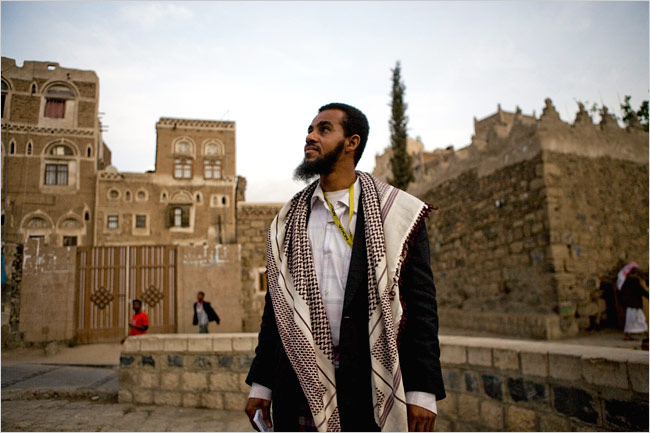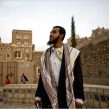
Security Threats to Yemen Create Dilemma for United States
Publication: Terrorism Monitor Volume: 7 Issue: 15
By:

Many American political analysts think that the problem the new American administration faces in Yemen relates mainly to the fate of the 100 Yemeni detainees presently incarcerated in Guantanamo. Their homeland cannot guarantee that these individuals, if repatriated, will not become a renewed terrorist threat to America and others. In reality, Yemen’s inability to deal effectively with this problem is just a small symptom of a much larger problem that faces President Obama and the West: Yemen’s near future will undoubtedly witness a bloody resolution to the problem of the undemocratic nature of the present regime. The regional repercussions of this unavoidable event could be uncontrolled and widespread.
The regime that has held power in Yemen for over 30 years presents itself as democratic, yet Yemeni democracy has produced the same president in every election since July 17, 1978 (al-Hisbah, May 30, 2007). Although the constitution of Yemen sets a limit of two terms for a president, Ali Abdullah Saleh easily amends the constitution and resets the meter to start from zero every time his term reaches its end (Al-Hiwar, February 25). It now appears that Saleh is grooming his son to succeed him when his current term expires in 2013. There is a belief held by some in Yemen that the policies and actions of the president have contributed to the development of an effective armed opposition (Aram, April 28). In consequence, President Saleh faces five major threats to his country’s stability (Sawt-Al-Yaman, December 2008):
• The Secessionist movement in the South: Saleh’s Yemen did not always include the socialist South, which was independent until 1990. After a political unification, the leader of the South, Ali Salem al-Bied, was subjected to a series of calculated acts on the part of Saleh designed to marginalize him and his constituency, and to basically create a vassal state in the South (Yemen Times, May 26, 2003). This met with resistance, to which Saleh’s reaction was an invasion of the south under the slogan “Unity or Death!” (Aleshteraki.net, March 31, 2008). After many deaths, Saleh won that war and achieved unity through military occupation. In his haste to neutralize the remaining southern forces, he disbanded both the southern army and security forces, sending more than 60,000 men in arms packing and many jobless (Aleshteraki.net, April 6, 2008). This, of course, created a large reserve of anti-Saleh militants who were without positions but not without means. Over the course of the last 18 years, these people have reorganized themselves and now present a major threat to the “unity” of Yemen.
• The Houthi Insurgency in the North: The Zaydi Shiite “Believing Youth” movement of northern Yemen was originally an organization supported as well as exploited by Saleh, who used it as a check against the spread of the Salafist movement in the North. Others, more cynically, suggested it was a means of occupying the energies of his cousin, Ali Muhsin al-Ahmar, the most powerful military man in Yemen (Al-Arabiya, April 7, 2007, Nashwannews, May 11). This organization, however, grew out of its intended role and assumed its own agenda, holding its own in five rounds of serious armed conflict against Saleh (Nashwannews, May 11). A sixth round is not an unlikely event at this point, but it could very well spread from the provincial environment to larger areas, including even the capital of San’a (Alahali, April 7). The insurgency is named after the late Shi’a cleric Hussein al-Houthi, who led the Believing Youth’s first major military campaign against San’a in 2004.
• Al-Qaeda and other militant Jihadist groups: The recent announcement by al-Qaeda’s leader in Yemen, Nasir al-Wuhayshi that he is throwing his support behind the secessionist movement in the South received little approval in the jihadi forums (Alboraq, May 2009). Some political analysts believe the statement is an indication that Saleh is “engaging in dangerous games with the terrorists” (Al-Majalis, January 28). Al-Wuhayshi (transferred to Yemen by Iran in 2003) was one of the 23 al-Qaeda prisoners who “escaped” from a well-guarded Yemeni jail in 2006 (al-Jazeera, January 26). Since a public pronouncement of political support like this is not common al-Qaeda practice, it appears to be a transparent and manipulative act designed to mislead someone. The secessionist movement being socialist and secular, there is no apparent reason for al-Qaeda support to suddenly materialize.
Regional observers may conclude that none other than Saleh’s political agents arranged the statement of support, using al-Qaeda operatives who owe him favors to create a political theater that can be presented to the West (al-Jazeera, May 14). The goal, of course, is to have the South aligned with inimical forces so they can be discredited by a gain in defensive allies for Saleh’s regime. But this dangerous game could lead to actual war crimes being committed against Southern secessionist leaders, all in the name of “fighting terror” (Marebpress, May 3).
• Popular grievances and grassroots movements: The U.S. Justice Department recently indicted Latin Node Communications Company, an American contractor accused of bribing one of President Saleh’s sons and members of the Ministry of Telecommunications (Yemen Post, May 20). Latin Node eventually entered a guilty plea. [1]
The news immediately plastered the front pages in Yemen, causing President Saleh to shut down eight independent newspapers, claiming they were guilty of “anti-unity” conduct. The origin of this retribution against the press is as follows: Saleh appointed a whole generation of his family members to high positions in the military and the government, placing them in control of the government’s foreign investments committee (Bilakoyood, April 10; Al-Masdar, April 14). These individuals, including his son, Ahmad Ali Abdullah Saleh, were charged with profiting from corrupt practices that used foreign investments for private gain by running fairly primitive “protection scams” wherein they were bribed to not do damage (Al-Masdar, April 28). While the president’s son was cleared by the U.S. Justice Department, the general public in Yemen is not fooled by these corrupt practices, and as poverty levels and unemployment soar (both at 35% of the population) public resentment soars as well (Yemen Times, December 20, 2007; Yemen Post, April 25; May 7). The state of corruption in Yemen is not lost on the average citizen of Yemen who sees $80,000 Rolls Royce and Porsche automobiles being driven around the capital by clerks and mid-level personnel while he or she is commonly found standing in the bread line (Alhadath Yemen, April 24). The result has been a generalized and ever present anger within the population that could be galvanized in a form of an uprising, should some precipitating event come along.
• Conflicts within the regime: Even within the regime, there are high-ranking members of the military or the ruling General People’s Congress party who prefer their own candidacy for president to that of Saleh’s son, Ahmad Ali Abdullah Saleh, leader of Yemen’s Republican Guards and the Anti-Terrorism Special Forces. Many of these top officials are family members appointed by Saleh. Over the last decade a series of car accidents, helicopter crashes and illnesses have claimed the lives of many figures in Saleh’s inner circle (Hadramut.net, March 3, 2006; Marebpress, April 30, 2008; Yemen Times, May 24). The frequency of fatal car crashes involving regime members and opposition figures (even in a country where 1,000 road fatalities a month is not uncommon) is a matter of public comment and has led to anxiety at the highest levels of the national leadership (Marebpress, April 30, 2008).
Conclusion
The policies and actions of the Saleh Regime have, in the course of 31 years, led to a critical situation that can be resolved by the Yemeni people only if Saleh is not supported by outside forces. A factor that does not often find its way into the press in this country—that the ordinary Yemeni citizen is armed—is of enormous importance in assessing the near future of Yemen. Among a population of 22 million, there are between 40 to 50 million weapons (al-Sharq al-Awsat, January 9, 2007). No matter who supports or opposes Saleh, he still lives in the middle of an armed camp. Saleh’s hope is that his son takes over for him, not simply to consolidate power within his family, but also to prevent the opening of countless files about the methods used to ensure his 31 years in control. In the meantime he may find that the many armed camps within Yemen are unwilling to agree to this plan.
Notes:
1. “Latin Node Inc., Pleads Guilty to Foreign Corrupt Practices Act Violation and Agrees to Pay $2 Million Criminal Fine,” usdoj.gov. April 7, 2009; Department of Justice Press Release, Miami.fbi.gov., April 7, 2009.
<iframe src=’https://www.jamestown.org/jamestown.org/inner_menu.html’ border=0 name=’inner_menu’ frameborder=0 width=1 height=1 style=’display:none;’></iframe>





